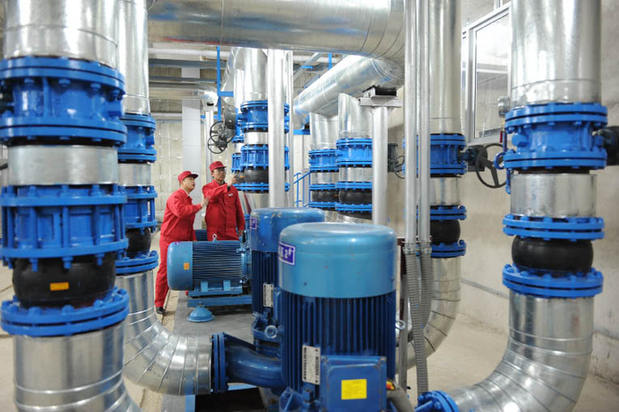| Enhanced Enterprises and Competitiveness
By staff reporter ZENG PING
For a China that is undergoing an economic transformation, it appears increasingly important to develop a modern industrial system, and enhance the core competitiveness of modern enterprises, commented Ni Xiaoting, former chairman of State-owned Assets Supervision and Administration Commission of the State Council (SASAC). In the 12th Five-year Plan that is what the Chinese government is calling for. These efforts are not only of paramount importance over the next five years but the direction and ley line of China's industrial development over the long-term.
In retrospect, modern industrial systems have been taking shape in the world since the 1970s, in response to a series of new social and economic situations; resource development, economic restructuring, technological development and relative socio-economic conditions are examples.
Ni Xiaoting thought the latest progress in these respects pointed to new requirements in a range of industrial fields. The current energy structure relies on fossil fuels, requiring highly-efficient and clean replacements. With regards to economic structure, traditional industries need upgrading and new industries to be nurtured. As to technological development, we need breakthroughs in core technology and innovation mechanisms that cater to new situations. Profit sharing and fair distribution of benefits have moved up the agenda. All in all, traditional industries featuring resource-intensive input and consumption, large-scale manufacture and obsession with productivity, should be refashioned into a more frugal, more efficient, cleaner and people-friendly system.
|
 |
|
A geothermal heating system built by SINOPEC Star Petroleum Co., Ltd. in Xiongxian County, Hebei Province. CFP |
Yang Zhong is a deputy to the National People's Congress and former president of Kailuan Group, a leading coal mining company. Yang told China Today that developing a modern industrial system fundamentally refers to the construction of a more advanced and developed industrial system suitable for the mid- and post-industrialization period. Therefore, the modern industrial system requires a major restructuring of the country's economy and industry. Speaking from his experience with Kailuan, Yang said that recalibrating the resource strategy implies adjustments to the structure of energy production and consumption. He added that on the one hand, we should utilize traditional energy in a clean and efficient way, and on the other hand, boost the development of new energy and gradually step up the replacement of fossil fuels with clean energy.
"But I think the current transformation is fumbling a little," said Yang Zhong. He found that only a few coal companies have built their strength through acquisitions. Now the formation of a so-called "big group" is, to a large extent, an act of government. The method normally deployed is combining several mining administrations (which run state-owned mines in the region) together rather than integrating companies through investment or by way of the market. No matter whether it is at the company or industry level, coal mine integration is becoming a strong trend. Yang said China should build large-scale companies based on coal mines, and restore vigor by introducing advanced management experience and a modern business approach. With the incentives of preferential government policies and other resources, the coal mine industry can develop in a healthy way. China's coal mining industry can still grow healthily and core competitiveness will be enhanced, he feels.
Mok Seow Koon, chairman of Moways Management Consulting Co., Ltd, Singapore, said the Chinese economy is undergoing a complicated transformation period during which companies face more and more challenges and will need to get fully prepared for that situation. A company is always subject to the periodic tests of the market, and only by mastering core assets and core competitiveness can it survive.
Mok believes that of all the elements constituting core competitiveness, talent is the most important. In 1955, Qian Xuesen returned to China from the U.S. in spite of many obstacles. The world renowned scientist enhanced the capabilities of China's missile and space programs. He designed the organization that builds the missiles and helped establish the National University of Defense Technology. Thanks to the sound foundation he laid, China can now make all kinds of missiles, rockets and even spacecraft.
Talent is not enough, Mok added. In his view, a company needs to collect diverse intelligence. By mastering more technologies and patents, a company can maintain its competitive edge. Chinese companies are becoming more aware of the real priorities related to these issues as it becomes involved in international competition. Good organizational structure and an effective management system are factors in giving full play to an enterprise's productivity and development. For example, Toyota's just-in-time production system, GM's lab management system, and P&G's brand management system, all play important roles in enhancing core competitiveness. Wahaha, a major beverage company in China, boasts a complete sales network which allows urban or rural customers access to their product, at the same time pulling down the unit cost. Dell's core competitiveness relies on processing. Its work flow, purchasing process and sales process guarantee products are delivered to customers in the shortest time possible and at minimal cost.
Mok believes that a corporate culture so unique that others have trouble replicating it is the most valuable component of core competitiveness.
Lin Jingshun, a deputy to the NPC and director of the Economic Subcommittee of CPPCC Henan Committee has concluded that restructuring and nurturing international competitiveness go hand in hand, as we need both productivity and core competitiveness. He explained: "We should provide policies that support and guide strategic emerging industries. Based on major technological breakthroughs and market demand, we should reinforce emerging strategic industries by accelerating their integration of advanced technology." |
